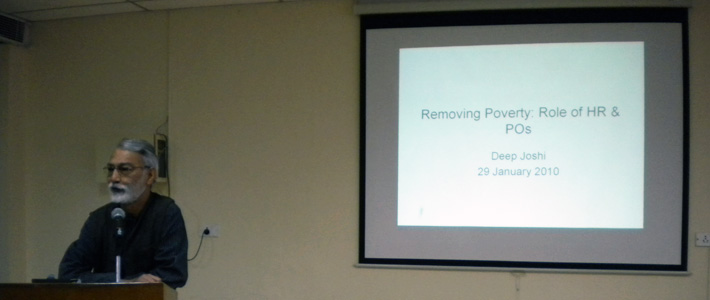
On January 29, 2010, IFMR hosted a seminar by renowned social worker and Ramon Magsaysay Award winner, Padmashri Deep Joshi. He is a postgraduate from MIT who had got back to India to work towards poverty alleviation and is the co-founder of PRADAN.
The seminar started with welcome remarks and introduction of speakers by Madhukar, with Bindu then delivering the opening address by giving a brief about IFMR and its work.
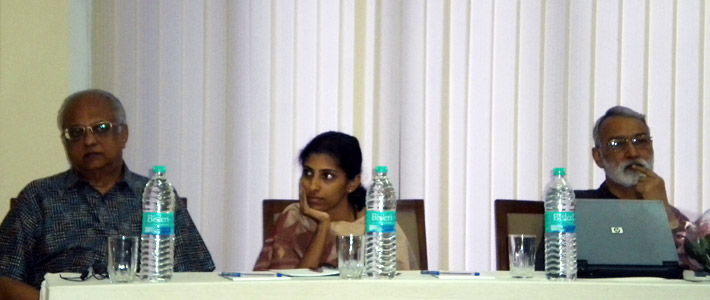
From left: Bobby Srinivasan, Bindu Ananth, Deep Joshi
Mr. Deep Joshi commenced his presentation on the topic Removing Poverty: Role of HR & POs. The topic adds relevance to the present Indian scenario that faces an imbalance between urban and rural development.
View the Presentation by Padmashri Deep Joshi
He defined poor people in terms of ‘Person’, ‘Place’ & ‘Position. Talking about poor people as ‘Person’, he indicated about social groups who are historically and structurally isolated and excluded from the society. These groups lack ‘self-efficacy’ and are stranded due to structural changes in society, economy and polity. Likewise he gave similar contexts to define the poor in terms of Place and Position.
He also presented a few shocking data on poverty in India – As per the Tendulkar committee (2009), 41% of population in rural India lives below the poverty line. He supported the figures with more data on the poorest states in India stating that the “poor “ are heterogeneous and explained about the kinds which are ‘Declining poor’, ‘Coping poor’ and ‘Dynamic poor’. He outlined that by understanding the kind of poor, strategies are to be framed, his model of a strategy:
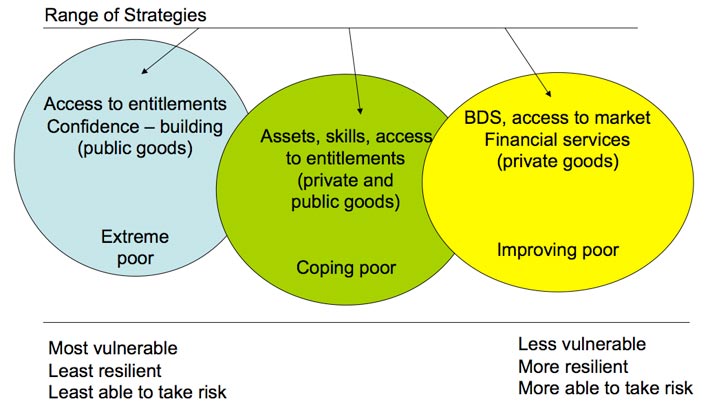
In terms of Human resources and the approach towards the poor, he insisted on the enhancement of self-efficacy through human capital that works on being empathetic, promotes inter-dependence, treating them as citizens rather than as clients or beneficiaries and finally building relationships.
On the role of people’s organization, he highlighted the need to learn from and with peers and also to aim for scale economies so that their services could reach to a larger population. He also emphasized upon working for constructive collectives and to be working against tragedy of the commons.
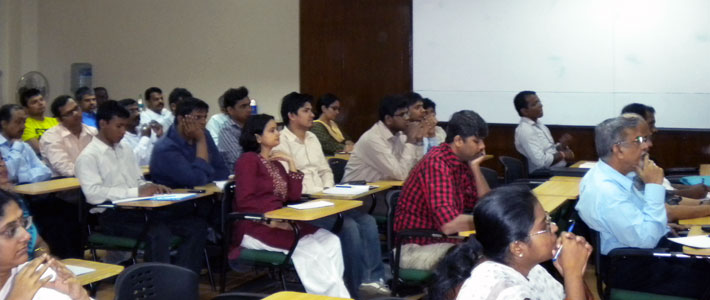
Audience in rapt attention
Finally, he outlined the important aspects that act as roadblocks to development. In this context he felt that the prevalence of complexity in understanding rural India curtails the understanding of the concept of “development”. He ended his speech by pointing out that rural–oriented course and institutes like IRMA are scarce in India when compared to the prominence given to IITs and IIMs.
His talk was filled with many real life examples that were vivid and simple. These examples and insights were derived from his work with Ford Foundation’s project on international case studies that are to be published soon.
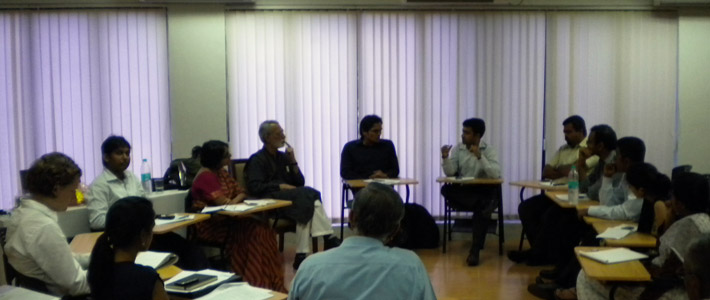
Teams interacting with Deep Joshi
Later, IFMR Ventures & IFMR Rural Finance teams had a chance to talk about their work during separate sessions with him. He carefully listened and appreciated different works of the teams and gave valuable advice.
At the formal close of seminar, Anu Valli gave the vote of thanks, and Deepthi Reddy on behalf of the IFMR Ecosystem presented a memento to Padmashree Deep Joshi. To conclude, Padmashri Deep Joshi is truly a visionary and it was a privilege to have him amongst us.
—
Priyanka, Intern, Human Capital Team and Madhukar, IFMR Ventures, CAFNE Team contributed to this post.


One Response
Hi, Everyone at IFMR is fortunate to have seen and interacted with Padmashri Deep Joshi. Can you please share his contact details to enable me to invite him to our university as part of our Silver Jubilee Lectures? I am Dr. Uma Chandrasekaran, Reader – Dept of Management Studies, School of Management, Pondicherry University, Puducherry. Office mail: uc.dms@pondiuni.edu.in
Thanks and best regards